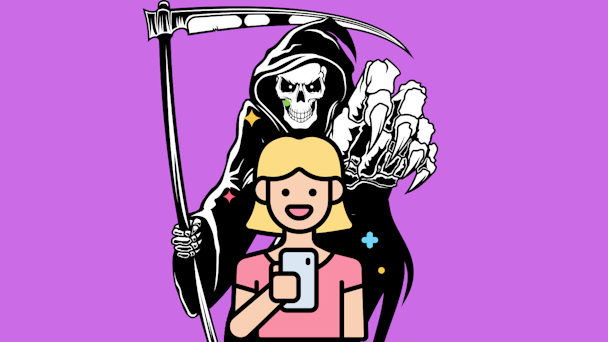3 trends shaping social: existential Gen Z, AI escapism and comatose creativity
We Are Social’s Mira Kopolovic has eloquently given form to the odd trends one observes online. Three trends, in particular, are intermingling uniquely.

There’s no better press than claiming to get internet culture. But despite headlines promising to reduce the zeitgeist to a dozen florid hashtags, it was bound not to be that easy. Culture, especially online, has always had a knack for self-encrypting.
But there are methods of peeling back the camouflage that overlays our meatiest feelings. One of these is to look beyond the loud middle of digital culture, instead scraping the edges for impactful outliers and clustered phenomena that gesture to a direction shift.
Below are three movements in this vein – nascent on social platforms today; and mainstream tomorrow.
1. Youth-reencryption
Gen Alpha’s new codes of youth culture are having a ripple effect on Gen Z’s values. Today’s spiciest generational star sign is clearly Gen Alpha, their split screen ‘sludge content,’ murderous toilet-themed miniseries, and typically inscrutable slang spurring moral panic in last year’s headlines.
But it’ll be some time before they’re meaningfully shaping cultural aspirations. Their more immediate-term effect is indirect: Gen Z, formerly known as The Youth™, are hyper-aware of their aging out of youth and relevance (they’ve made this awareness clear through their semi-ironic laments at being “the next cringe generation on the chopping block).
Advertisement
Alpha’s soft launch as ‘the new youth’ is important because so much of what we think of as internet culture today is a product of Gen Z’s self-conception as ‘the youth’ – or, to be more precise, their self-awareness of how their youth limits their agency.
Earnest values paired with nihilistic humor; motivation tinged with despair; hypersociality amid alienation – many of today’s smoothest brands and creators embody these ‘very internet’, very Gen Z qualities. But these qualities were borne out of Gen Z’s sense of disempowerment in the face of existential risk.
Now, as this cohort loses youth and gains power, it’s set to change their self-conception – and, by extension, what resonates with them.
2. New God_Mode
People are harnessing fantasy worlds for real-world impact. For anyone with a god complex, the internet is a perfect petri dish for worldbuilding. Everyday users have been getting their kicks from imagining and making other worlds – visualising Hogwarts as a Black university; and rewriting Shrek as a sci-fi – since the early days of fanfic.
Last year, gen AI mainstreamed worldbuilding among everyday users; seven in 10 Gen Zers use the technology, saturating the social internet with infinite AI-made fantasy productions.
Advertisement
These new realities – from queer Marvel universes to fan-generated Nicki Minaj kingdoms – are enough to provoke glee, for now. But if taking refuge in fantasy worlds is entry-level, using fantasy to shape reality is advanced.
Users are pushing virtual worlds beyond escapism, instead repurposing them as spaces for engendering offline impact. Some of these are explicitly political, as with Gen Alpha’s pro-Palestine protests on Roblox. But others have broader, vaguer ambitions, like the cluster of new wave spirituality movements (#shifting, #delulu and #luckygirlsyndrome) that use the supernatural not as an escape from the real world but as a mechanism to change it.
These worlds are no longer just safe havens – today, they’re tools.
3. Originality anxiety
The internet is grappling with how to redefine creativity in the age of AI, algorithms, and nostalgia.
If there’s one consensus on today’s internet, it’s that everything is ‘mid.’ A dizzying amount of content is being created and consumed, and yet there’s a social-wide sense that creativity is, if not dead, at least comatose.
Suggested newsletters for you
There’s much speculation as to the root of this chronic ennui, but three drivers head the pack: culture has reached peak nostalgia, platforms have reached peak algorithms, and content has reached peak automation (in the form of AI tools that recycle existing material into new arrangements).
Users know that their feeds optimize for agreeable, not challenging, and this has sanded off the rough edges of culture, taking the avant-garde with it. Once algorithm-induced ‘beigeness’ knocked our creative confidence, generative AI prepped its coffin nails. One artist notes that “Midjourney is a perfectly named software to describe one’s foray into AI generative art. That journey is 1000% mid”.
Now, as a culture obsessed with ‘creativity’ grapples with how to redefine it, dedicated users are paving the way back to originality. We see it in projects like YouTune, which fights algorithmic influence by auto-redirecting listeners to songs that have only been streamed a few times, or Obsolete Sounds, an extinct sound repository that tries to reframe nostalgia as productive.
On tomorrow’s internet, brands and creators have a choice: pander to underwhelming norms of creativity or face these barriers head-on.

